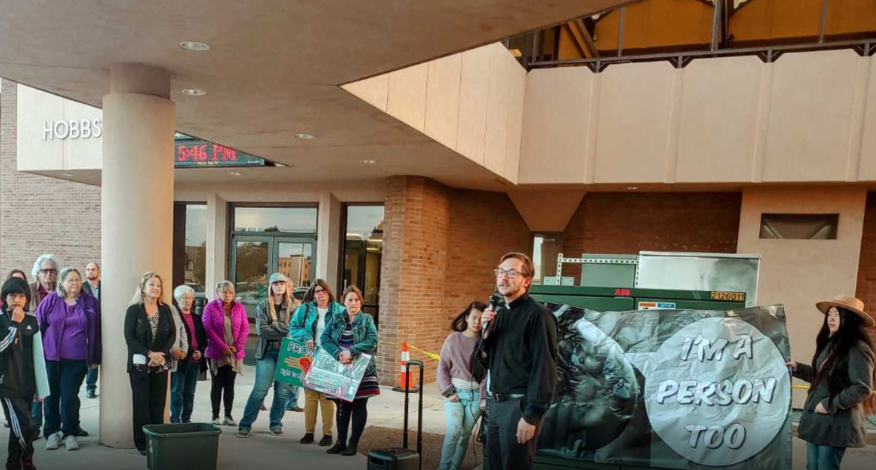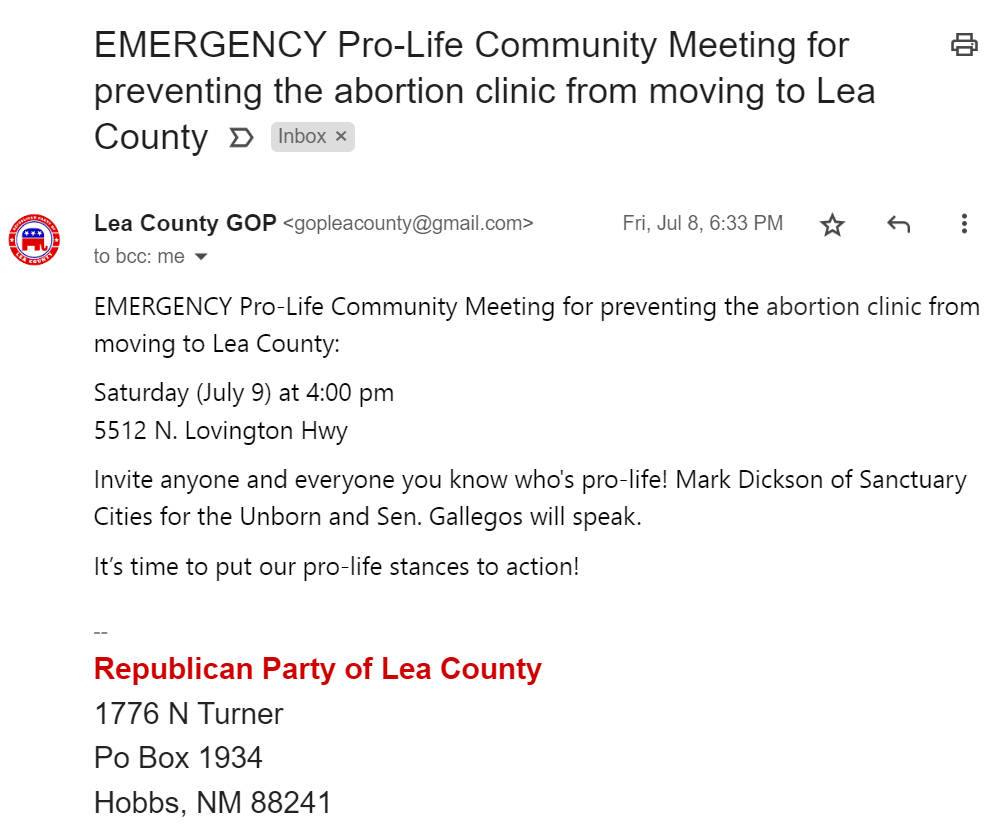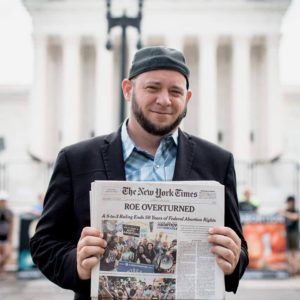
Though abortion remains legal in New Mexico following the overturning of Roe v. Wade by a conservative Supreme Court earlier this year, local municipalities are taking action to limit access. Many in the southeastern part of the state previously relied on services in Texas, but with its strict abortion ban, New Mexicans have to look closer to home for reproductive care.
Extreme anti-abortion activists have been working around the country to ban and limit access to abortion. With no federal protection for abortion, it has become a matter of states’ rights. However, in states where abortion remains legal, activists are taking it a step further, pushing for county and city bans. Hobbs and Lovington are both targets of this recent political effort.
In its most recent regular meeting, the Hobbs City Commission approved the “first reading” of a proposed ordinance that would prohibit the use of abortion-inducing medication and educational material. However, this prohibition is built on dated laws that are largely seen as unenforceable by legal experts. So while the ordinance would primarily be symbolic, it could still cause legal headaches for people seeking an abortion or abortion providers in the area should anyone decide to press a lawsuit.
Comstock Laws of 1873
Anti-abortion activists are pointing to 19th century “obscenity laws” as the basis for their legal effort to block abortion-inducing medication. Hobbs City Attorney Effren A. Cortez provides background information and summarizes (PDF) the proposed ordinance, writing, “Now, the City of Hobbs seeks to require abortion providers to comply with federal law as a condition of obtaining a business license to operate within the municipal boundaries of Hobbs, New Mexico.”
The federal law referenced by Cortez is 18 U.S.C. §§ 1461–62, which calls for a prison sentence of up to 5 years for the distribution of “any drug, medicine, article, or thing designed, adapted, or intended for producing abortion, or for any indecent or immoral use.” This is an evolution of a series of acts from as early as 1873 which became known as the “Comstock Laws”. The first Comstock Law criminalized the use of the US Post Office to send a variety of items considered “obscene” at the time, such as sex toys, contraceptives, personal letters with sexual content and abortion-inducing medications.
Over time, attempts to repeal the Comstock Laws failed, but most were eventually found unconstitutional. In 1971, Congress specifically removed contraceptives from the prohibited items listed.
According to law professor David S. Cohen, circuit courts have decided these laws can only apply to illegal items. While the recent Dobbs v. Jackson Women’s Health Organization (which overturned Roe) removed federal protections for abortion, it did not make abortion illegal. Therefore, abortion is still legal, and according to Cohen, “since abortion is legal and the FDA has approved distribution of mifepristone [an abortion-inducing drug] as safe and effective, including by mail, these are lawful activities and items, thus the law, as interpreted by the courts, doesn’t apply.”
The Rightwing Crusade
Despite the shaky legal ground, far-right extremists have been orchestrating nationwide efforts to limit abortion using these dated laws for cover. Because access to abortion is generally a popular opinion in the United States, and particularly in states like New Mexico, these activists use “existing federal law” as rhetorical cover for their agenda.
At the most recent meeting of the Hobbs City Commission, activists from outside of the state showed up to voice their support of this local ordinance. A crowd of anti-abortion protestors gathered in front of Hobbs City Hall. Many were from Texas as well as other parts of New Mexico. Religious leaders in particular showed up, bringing with them members of their congregation.
Similarly, a city commission meeting in Lovington also turned out anti-abortion activists, with many being encouraged to attend by their church leaders.
The most recent pushes to limit abortion seem to be largely focused on preventing a Texas abortion clinic from coming to the area. The Lea County Tribune previously reported about Whole Woman’s Health (WWH) looking to move its operation to New Mexico. After hearing of this news, the Lea County Republican Party called an “emergency meeting” specifically to strategize on ways to prevent the clinic from coming to the area.

The ordinance in question is certainly written in a way to specifically target abortion clinics and prevent their operation in Hobbs. While the obsolete law referenced could apply to any individual, the ordinance focuses primarily on how compliance with that law will be necessary to obtain a business license in the city. This could create a legal gray area for an abortion clinic because, even though the law is likely unenforceable, they will have to agree to comply in order to obtain a business license. This would not prevent them from providing abortion services, but could greatly limit what medications they have access to. It could also prevent them from mailing abortion-inducing medication outside of the state (such as to patients in Texas where abortion is banned).

The group Sanctuary Cities for the Unborn has been open on social media about its intention to prevent WWH from coming to Lea County. One of its members was quoted as saying, “As a resident of Hobbs, I’ve been overwhelmed by the pro-life groundswell since the news of Whole Woman’s Health targeting our community came to light. We are not just pro-life, we believe in a God-given right to life that happens to be enshrined in our constitution.”
The group is led by Mark Lee Dickson, a pastor and anti-abortion activist of Longview, TX. He has described himself as a “36-year old virgin” who has no personal experience with abortion. Dickson has been reported by the Washington Post as “paving the way” for Texas’s statewide abortion ban as he pushed for local abortion bans throughout many Texas cities.
Dickson and his group are making a similar push throughout many towns and counties in New Mexico.
Final Vote Expected in the Coming Weeks
City attorney Cortez states that the the proposed ordinance does not prohibit abortions nor does it protect abortions in Hobbs. “It does not contradict state law, and it does not contradict federal law. What it does is that it requires the operator of an abortion clinic to obtain a license in order to operate in the City of Hobbs. What it does is that it requires the operator of an abortion clinic to abide by federal law. And what it does is that it gives the [city] commission the authority to issue, revoke and reconsider a license to operate within the City of Hobbs.”
With only the first reading approved, it is still too soon to say whether the ordinance will go into effect. Hobbs city commissioners will need to vote on the ordinance at a future meeting, and until then the ordinance is being made available to the public for their review and feedback. Area residents are encouraged to contact commissioners directly to share their thoughts on the proposed ordinance.


